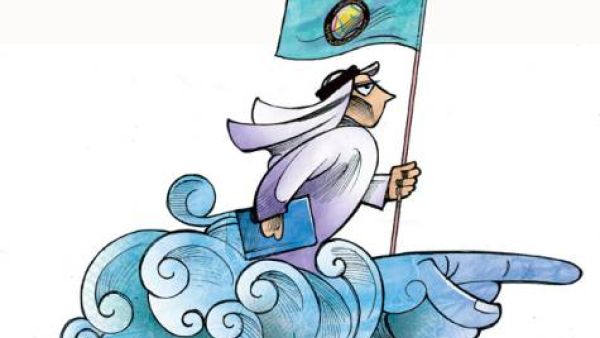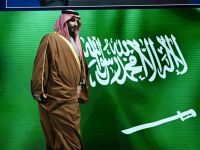On May 25, the Gulf Cooperation Council turns 30. During its first three decades, the GCC experienced a variety of high and low tidal waves of cooperation. Certain events brought its six member states closer and others took them farther. The council enters its fourth decade with its neighbourhood undergoing seismic shifts. For better or worse, much of what the GCC has geopolitically taken for granted is now no more or — at the very least — put into great question.
To understand the GCC one must start at the very beginning. The GCC was founded exactly three years after the Egyptian-Israeli peace treaty and less than two years after Iran became an Islamic republic.
Those two events are noteworthy since the former was the last nail in the coffin of pan-Arabism and the triumph of the Islamic awakening or Sahwa and the latter heralded the emergence of a Shiite theocracy that would combat Saudi Arabia's prominence as self-appointed theological guide of the Muslim people — at least the ones in the Middle East. And so while the six Gulf states had — and continue to have — border disputes, they collectively agreed to formally create a coordinating council.
Article 4 of the GCC's charter lists the council's objectives that, in addition to general calls for integration and the strengthening of relations, aim to specifically achieve the following:
1. Uniform regulation and citizen treatment in:
- a. Economic and financial affairs
- b. Commerce, customs and communications
- c. Education and culture
- d. Social services and healthcare
- e. Tourism and media
- f. Legislation and administration
2. Scientific and technological progress in:
- a. Industry
- b. Mining
- c. Agriculture
- d. Water and animal resources
3. Establish scientific research centres
4. Establish joint ventures and encourage cross-border private sector cooperation.
Cooperation on regulation and integration remains a mixed bag of failure and success. The common market agreement in the beginning of 2008 was a historic milestone that addressed movement and residence, employment and pensions, investments and ownership, Capital movement and tax and education, health and social services.
Other examples of successes include the completion of the second phase of the three-phased GCC power grid. The Dh5.1 billion project is set to save the GCC states Dh18.4 billion in electricity costs. The Dh55 billion GCC rail project, agreed upon in 2003 and mandated in 2009, is expected to be operational by 2017.
Educational programmes
However, the GCC customs union, agreed upon in 2003, was just delayed again till 2015 and the GCC common currency, even with Oman and the UAE formally withdrawn, remains a stalled project.
While, the Gulf states boast a number of good educational institutions such as the King Fahd University of Petroleum and Mining and the American University of Sharjah, the GCC as a body has not been directly related to such achievements.
In fact, the Arabian Gulf University founded in 1981, which credits the GCC's formation as inspiration for its own founding, continues to have only three faculties: medicine, business and graduate studies. Founded in 1976, the GCC's Joint Programme Production Institute had its heyday in the eighties with the incredibly successful Arabic version of Sesame Street, Open Sesame.
Other educational programmes such as Salamtak (Your Health), a programme that promoted health awareness, and Qif (Stop), a programme that promoted responsible driving, remain the Gulf's most successful social awareness programmes to date. However, although the institute remains active, there's been a significant decline in calibre of its productions.
Defining moments
With respect to scientific and technological progress, most of what's been achieved has been done by state-owned enterprises (SOEs) such as Aramco and Sabic in Saudi Arabia and Dubal in the UAE.
Scientific research is yet to be pursued seriously in the GCC and the private sector's most visible cross-border investment has been etisalat's acquisition of a Saudi telecom licence through a consortium that included prominent Saudi interests.
And so vis-a-vis its charter, the GCC's achievements probably warrant a C+ with most of that score made in the last decade.
Strategically speaking, the Gulf has had its share of defining moments. Barely six months in, the foiled coup d'état in Bahrain by the Iran-backed Islamic Front for the Liberation of Bahrain tested the GCC's resolve.
Soon afterwards, the Gulf's backing of Iraq in its fruitless eight-year war with Iran in the eighties proved to be a decision of complex legacy when Kuwait was invaded by Iraq over an oil field dispute in 1990.
The GCC states' economic viability was stress-tested in the nineties with oil under $30 (Dh110) for most of it. The events of September 11 and the subsequent war on terrorism forced it to review its relationship with and tolerance of Islamism and promote values of tolerance and moderation.
Finally, the GCC came under pressure with the Arab Spring of 2011. As revolutionary unrest has swept the Arab world, the GCC has found itself at existential odds with it. For one, it comprises monarchies based on tribal allegiances. More importantly, the fall of long-time allies such as Egypt's former president Hosni Mubarak unbalanced its delicate cold war with Iran.
Needless to say, the recent decision to formally consider the Jordanian membership request and invite Morocco to join the council demonstrates just how concerned the GCC is from, not the Arab Spring itself per se but its geopolitical reverberations.
The Khaliji society, and its identity, has also evolved over the last 30 years. A generation of Khaljis that grew up over Nasserite rhetoric was learning, or rather being taught, that it was hallow because it left God out. After all, how could they expect to win any war against the Jews without God's help?
Resurgence in practising Islam was upon the Gulf. Old pictures of girls in short dresses and blow-dried hair were swiftly disposed of. Men trimmed their hair, grew their beards and ditched their Charleston pants for Khaliji thoubs. It was not necessarily an age of piety, but a conservative one.
The Soviet (read infidel) invasion of Afghanistan made that realisation even more vivid. Jihad became, literally, all the rage. It was the Gulf's knighthood. In tandem, the Gulf's quality of cultural production declined, from theatre to music and from fashion to architecture — everything just got ‘dumbed down'.
The Gulf society was lost after pan-Arabism and so they decided to find what they lost there in Islam. And it seemed to work until the USSR fell and former Iraqi president Saddam Hussain invaded Kuwait.
Suddenly, Osama Bin Laden's Arab Afghans became a liability, CNN was part of the Khaljis' day and an oil-for-stability-pact was signed with America; the Gulf was about to get liberal. Oil prices were low, and prices of regular cars had crossed the Dh100,000 mark for the first time.
A credit-driven demand culture was emerging. African tales of Islamic fundamentalism became relevant after September 11 and Osama Bin Laden was swiftly branded a Muslim gone astray. Friday sermons became milder and loyalty of strict adherents to Islam became questionable. This all took a toll on the Gulf society as a whole.
On the one hand, the Gulf was trying to maintain the conservative facet of its identity and on the other hand, all things western fascinated Generations X and Y. Add to that the general perception that, though it was wrong, terrorism was a natural reaction to American imperialism in the Middle East and its unwavering support for Israel.
It became very clear that society was stuck between a rock and a (very) hard place. Finally, the arrival of the Arab Spring put questions of socioeconomic reform indisputably at the forefront of society's collective consciousness. How should the Gulf society feel about the Arab Spring? What do the new generation want from its government?
After a decade of affluence and — some would argue — decadence, the Arab Spring has forced political, economic and social awareness upon the Gulf's society — which, save Kuwait, has been fairly apolitical.
It is highly doubtful that the citizens of the Gulf are interested in replicating the Egyptian revolution, however it is likely that it has made them self reflective and less cynical of the reality of necessary changes.
Beyond socio-political anxieties though, the GCC's citizens continue to struggle with issues of modernity and Khaliji-Arab identity with the prevailing notion that they are mutually exclusive. The state, rate and quality of cultural production and research in the Gulf is the main contributor to that perception.
The GCC's combined GDP is circa $917 billion. This makes the council's collective economies the 16th largest economy in the world. However, with a growing population sponsored by a welfare state model, which in turn is financed by oil and gas revenues, the GCC's economic sustainability remains a concern.
Bailout fund
Attempts to diversify the economy have been limited to the establishment of Sovereign Wealth Funds that reinvest oil and gas proceeds and industries reliant on cheap feedstock of oil and gas e.g. petrochemicals, aluminium and cement. While both efforts have been very successful, they remain heavily dependent on oil and gas and their revenues.
Efforts to build a knowledge economy and boost entrepreneurship continue to show limited signs of success due to regulatory hurdles, a ‘fear of failure' culture and — in some states — high-paying public sector employment opportunities.
In response to the Arab Spring, the GCC established the Gulf Development Programme (GDP), a Gulf bailout fund. Its first order was to grant Bahrain and Oman $10 billion each over 10 years. Bahrain and Oman both face serious challenges of attracting investment and job creation.
With 50 per cent of its population under 18, Saudi faces existential job creation challenges, though its oil proceeds will be able to address these challenges in the short term.
The UAE and Qatar remain the most comfortable with minority citizens and a generous welfare system. With a seasoned investment authority and an oil sector but mired by combative parliament and a non-starter cabinet, Kuwait sits somewhere in the middle.
What all the GCC states do share however is the complete absence of an economic diversification plan that is not dependent on oil. Attempts to build the knowledge economy in Dubai and now other city-states across the Gulf have predominantly transformed into real estate projects.
The combination of all the above and the lack of long-term strategic planning have rendered the GCC a reactionary bloc. Most notable is the absent role of government-affiliated think tanks that assist in scenario planning.
While the GCC is uncomfortable with some of the unexpected changes of the Arab Spring, it remains unclear where its members want the bloc to go head. Also, though unclear if the two will enjoy the full benefits of the membership, the possibility of Jordan and Morocco joining the council seems to imply that the GCC may — for immediate future at least — transform into a league of (secular) monarchies to combat an emerging counter-league of (Islamist party tolerating) democracies.
However, it remains unclear if all member states view, or are able to view, all the GCC's new and old neighbours in the same light.
Case in point is Iran, with which Oman and Qatar have historic and commercial ties that require the two countries to maintain less hostile relationships to it than Saudi Arabia, Bahrain and the UAE.
The preoccupation with the above may also explain the lack of clarity on how it views the BRIC states and what it wants from them.
Mainly owing to its fossil fuel wealth, as it turns 30, the GCC remains an important bloc. However, it faces existential threats of long-term relevance, conformity, homogeneity and competitiveness.








